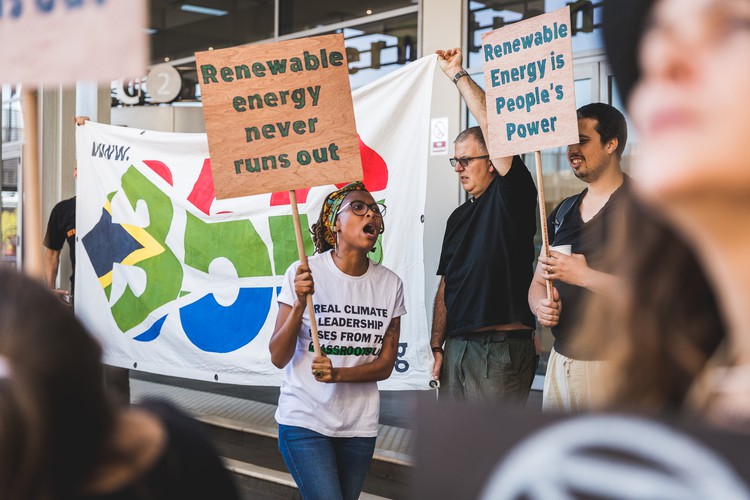
More than 40 people, individuals and representatives of various organisations – 350africa.org, Fossil free for South Africa, Project 90 by 2030, Green Anglicans among others – picketed at the Energy Week Gas summit at the Westin Hotel in Cape Town on Tuesday morning. Photo: Yann Macherez
11 December 2018
Energy Week South Africa, an international Gas Cooperation Summit, is currently taking place at the Westin Hotel, Cape Town. The summit focus is on gas, renewable energy and black industrialists in the energy sector.
But one of the major discussions will be on the funding of two major coal power plants – Thabametsi in Limpopo and Khanyisa in Mpumalanga.
International organisation 350.org, which advocates a stop to all new coal, oil and gas projects, has called for a protest against these two new coal power plants. More than 40 people responded – individuals and representatives of various organisations, including 350africa.org, Fossil free for South Africa, Project 90 by 2030, and Green Anglicans, picketed at the Westin Hotel on Tuesday morning.
“Our demonstration aims to send a message to the Development Bank of Southern Africa to commit to not funding the Thabametsi coal-fired power plant. Their plans to fund this station are dragging the country’s efforts to address climate change backwards,” said Ahmed Mokgopo, campaign manager for 350africa.org.
Coal-fired power plants provide about 90% of South Africa’s electricity. The country is Africa’s top emissions polluter. Government has said it aims to diversify the nation’s energy mix, but the country has vast coal reserves.
The inclusion of new coal plants in South Africa’s energy future will cost the country’s electricity consumers R19.68 billion more than in present value terms over their lifetimes, compared to an optimal and least-cost energy system that combines wind, solar and gas, according to a study by University of Cape Town’s (UCT) Energy Research Centre (ERC).
“This figure could be better invested building South Africa’s economy, social protection systems and a just transition pathway,” said Neil Overy from 350africa.org.
Reverend Rachel Mash, Green Anglican coordinator said, “Mpumalamnga and Limpopo are already hot spots for air pollution. Those two coal power plants will put another huge threat on local population’s health.”
Mokgopo said, “We need to take bold, brave stances to ensure a safe climate for future generations. We’re hopeful sense will prevail.”